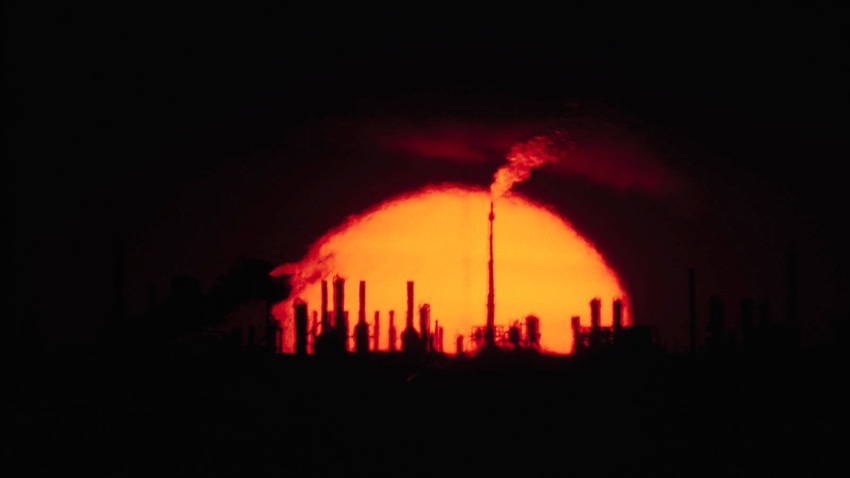Report Slams Use of Taxpayer Dollars to ‘Feed the Plastics Industrial Complex’
The report from the Environmental Integrity Project strongly opposes use of public funds to support companies that “manufacture pollution,” which disproportionately hurts communities of color.
March 15, 2024

At a Glance
- More than half of plastics plants built or expanded since 2012 received subsidies totaling $9 billion, report claims
- 84% of those facilities violated air pollution limits, but manufacturers reportedly seldom faced penalties
- Two-thirds of people who live within three miles of 50 plastics plants examined by the report are people of color
A vitriolic report issued yesterday by the Environmental Integrity Project accuses the US plastics industry of accepting billions of taxpayer dollars and government subsidies while exceeding air pollution limits that disproportionately threaten Black and Latino communities that live nearby.
The report claims that 64% of plastics manufacturing plants built or expanded since 2012 received subsidies totaling some $9 billion, and 84% of those facilities violated air pollution limits.
The EIP’s report, Feeding the Plastics Industrial Complex, examined 50 plants that were built or expanded in the United States since 2012, 32 of which received a total of almost $9 billion in state and local subsidies. Two thirds of the more than 591,000 people who live within three miles of the plants are people of color.
Alarming pattern
The report claimed to find an alarming pattern where companies that manufacture plastics and their main chemical ingredients receive tax breaks and government subsidies and — to win that taxpayer support — often make public promises to protect health and the environment. But once the subsidies and building permits are granted, they fail to keep their promises by releasing pollution, often during malfunctions, breakdowns, and industrial “upset” incidents that release dangerous chemicals, the report claims.
Despite this, the manufacturers seldom face penalties and never have their public subsidies revoked, no matter how frequent their environmental permit violations, the report said.
“We don’t need taxpayer support for private companies that essentially manufacture pollution — single-use plastics that end up as litter and toxic air pollution that disproportionately hurts communities of color,” said Alexandra Shaykevich, EIP research manager and an author of the report. “The plastics industry deserves penalties and more oversight — not more government handouts — for the environmental harm it is causing.”
High-paying jobs a "false promise"
The report does acknowledge that the subsidies typically require companies to create a certain number of jobs often at designated wage levels. But those promises are not always kept, according to EIP, and it questions the value of those job creation programs to the community. “The promise of high-paying industrial jobs is often a false one for people of color,” the report states, citing research conducted by the Tulane University Environmental Law Clinic.
The alleged poor environmental track record of plastics manufacturers is alarming, EIP says, because the industry is expanding rapidly, and more communities are being asked to consider public subsidies. Across the United States, 10 new plants that make plastics or their main chemical ingredients have been proposed for construction over the next five years; expansions are planned at 17 existing plants, including in Texas, Louisiana, Ohio, and Kentucky.
These could add at least 35 million tons of greenhouse gases a year and 14,493 tons of health-damaging air pollutants, including particulate matter and volatile organic compounds, according to EIP.
EIP’s report examined public records and company announcements about new or recently expanded facilities that manufacture plastics and their main chemical ingredients, including ethylene and propylene (which are base ingredients for a wide variety of plastics), polyethylene, polypropylene, PVC, and PET. Among the main findings of the report are:
At least two-thirds of these plastics plants (32 of 50) received tax breaks or subsidies from state and local governments worth a total of nearly $9 billion over a decade, or an average of $278 million per facility.
On an annual basis, that means more taxpayer money is going to plastics manufacturers than to the combined annual budgets of the state environmental protection agencies in the largest plastics producing states, Texas and Louisiana.
Despite frequent claims by the industry that it would protect the environment, 84% of the plastics plants (42 of 50) violated their air pollution control permits over the last three years, according to the Environmental Protection Agency’s Enforcement and Compliance Online database.
The plants reported releasing 63 million tons of greenhouse gases in 2021, as much as 15 coal-fired power plants. They also released 471,744 pounds of benzene (a carcinogen), 27,923 tons of nitrogen oxide (which contributes to smog), and 20,182 tons of carbon monoxide (which can cause headaches and dizziness), among other pollutants.
94% of the plastics plants reported a total of at least 1,242 accidents and incidents of various kinds over the last five years — including breakdowns, fires, and explosions — that released nearly 34 million more pounds of air pollution.
Although these “emission events” often release more pollution than legally allowed under their permits, companies claim these emissions cannot be prevented and rarely pay penalties or take serious action to fix the problem.
Under-reporting of chemical releases from plastics plants is widespread. Air monitors at seven plastics plants found that the levels of benzene at the fence lines between the factories and the community in 2020 and 2021 ranged up to 14 times higher than previously known, based in part on under-reporting by the companies, according to an Environmental Protection Agency (EPA) memo cited in the report.
For about a third of the plastics plants (15 of the 50), state environmental agencies modified the plant’s permit limits to allow more emissions of one or more pollutants after the initial permitting of the facility or expansion project.
The report outlines local case studies of pollution violations — including during explosions, fires, and dangerous chemical releases — in Louisiana, Texas, and Pennsylvania.
Indorama received tax breaks worth $73 million
In Westlake, LA, for example, Thailand-based Indorama, the largest manufacturer of PET plastics in the world, received tax breaks from the state worth $73 million over a decade, the report said. After the opening of the renovated plant in 2019, the facility released more than 90 times the amount of volatile organic compounds (VOCs) in the first five months of the year than was legally permitted in a whole year, state records show. The Louisiana Department of Environmental Quality issued 13 warning letters to Indorama for air pollution violations. But instead of cracking down or penalizing the plant, the state approved changes to Indorama’s pollution control permit four times between 2018 and 2023 that allowed the plant to release more air pollution — including a tripling of its permitted VOC emissions, the report said.
Rev. Dr. Theron Jackson, a leader with Together Louisiana, a statewide network of more than 250 religious congregations and civic organizations, said: “The tax exemptions that we grant to Louisiana's chemical plants would otherwise go to fund our schools, law enforcement agencies, and public infrastructure. Local public services are crumbling while profits for multinational corporations skyrocket. Our current model, which risks treating tax exemptions for industry as an entitlement rather than an incentive, undermines our communities' prosperity, our citizens' health, and the future of our planet.”
The report makes the following recommendations to address the issues it raises:
State and federal regulators should deny permits for facilities that make primary ingredients used mostly in single-use, disposable plastics. Permits that are issued to plastics plants should impose strict and legally required pollution limits that protect the health of nearby communities, minimize climate pollution, and are based on an accurate accounting of emissions.
Fenceline monitoring should be required at all plastics plants. EPA has proposed standards that would require this monitoring for multiple carcinogens, including benzene, and corrective action at about half of the plastics plants studied in this report. These standards should be strengthened, expanded to all plastics plants, and promptly implemented.
Plants should face accountability for breaking the law. Under the Clean Air Act, plants must comply with emission limits at all times, including during accidents, startups, and upset events. But plastics plants frequently violate permit limits. Plastics plants must be required to submit prompt, accurate reports of emissions, and then EPA and state environmental agencies must follow through and take meaningful enforcement action.
The public should have access to pollution information. Emissions data, including real-time fenceline monitoring results and malfunction reports, should be posted promptly to a public, online database that is easy to use. Communities should receive alerts of any accidents or threats relating to plastics plants.
Reject subsidies and tax breaks for plastics manufacturers. Public funds should be used to benefit projects that improve public health. Local entities should reject and revoke subsidies for plastics plants that expose neighboring communities to harmful air pollution and violate their environmental permits. Government subsidies should be contingent upon environmental compliance.
The Environmental Integrity Project (EIP) is a nonprofit organization dedicated to protecting public health and natural resources by holding polluters and government agencies accountable under the law, advocating for tough but fair environmental standards, and empowering communities fighting for clean air and clean water.
About the Author(s)
You May Also Like




